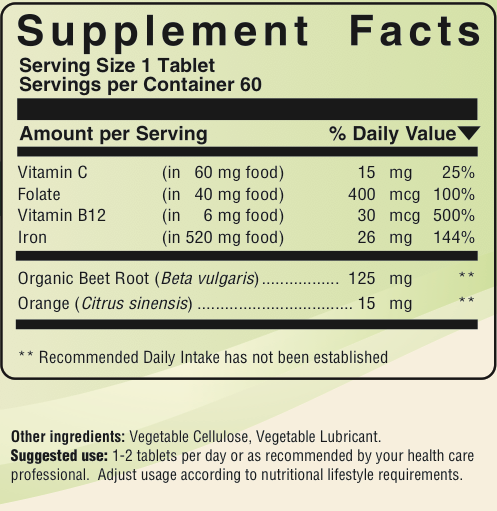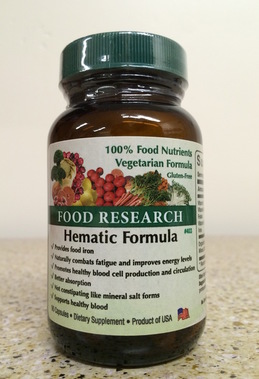
Hematic Formula
90 Tablets $26.98
Vegetarian Formula * Dietary Supplement
90 Tablets $26.98
Vegetarian Formula * Dietary Supplement
 |
||
|
||
100% Food Hematic Formula is a natural Food complex source of folate, vitamin B-12, vitamin C, and iron. Hematic Formula is not constipating as many other iron-containing supplements are because it is a Food and contains organic iron as 100% Food and does not contain any iron mineral salts. Hematic Formula is better absorbed and retained than the commonly sold synthetic vitamin and rock formulas. Various forms of anemia (including iron-deficient anemia, pernicious anemia, vitamin B-12 anemia) often have a nutritional component [1-3] and near-constant or mid-afternoon fatigue are common symptoms.
| Food Nutrient | Compared to USP/Mineral Salt? |
| Vitamin B-9, Folate | More utilizable above 266mcg [1]. |
| Vitamin B-12 | Naturally active form [1]. |
| Vitamin C | Up to 15.6 times antioxidant effect [4]. |
| Iron | Non-constipating, better absorbed [5]. |
Vitamin ‘B-9’, Folate:The vitamin once known as B-9 exists in foods as folate. Initially Food folate was given for people with a pregnancy-related anemia in the form of autolyzed yeast; later a synthetic USP isolate was developed [1]. Pteroylglutamic acid (folic acid), the common pharmacological (USP) form of folate is not found significantly as such in the body [1]. “Folic acid is a synthetic folate form” [3]. Folic acid, such as in most supplements, is not found in Foods, folate is [6]. “The highest concentrations of folate exist in yeast…and brocolli” [1]. Insufficient folate can result in fatigue, depression, confusion, anemia, reduced immune function, loss of intestinal villi, and an increase in infections [2]. Since the Recommended Daily Intake for folate is 400 mcg per day, and the body has difficulty converting more than 266 mcg of folic acid into useable folate per day [1], folate supplementation obviously should be in Food folate forms and not folic acid!
Vitamin B-12: Initially Food vitamin B-12 was given for people with pernicious anemia in the form of raw liver, but due to cost considerations a synthetic USP isolate (cyanocobalamin) was developed [7]. Cyanocobalamin, the common pharmacological (USP) form of vitamin B-12, is essentially cobalamins combined with cyanide! [7]. The only two naturally active forms of vitamin B-12 in the human body are methylcobalamin and deoxyadenosylcobalamin and those are in Food [1]. Vitamin B-12 when ingested in its human-active form is non-toxic [1], yet some researchers have concluded “The efficacy and safety of the vitamin B-12 analogues created by nutrient-nutrient interaction in vitamin-mineral supplements is unknown” [8]; interestingly some synthetic vitamin B-12 analogues seem to be antagonistic to vitamin B-12 activity in the body [9,10]! Insufficient vitamin B-12 results in anemia, degeneration of peripheral nerves, and skin hypersensitivity [1,2].
Vitamin C: Some of the many functions that vitamin C is involved in include collagen formation, carnitine biosynthesis, neurotransmitter synthesis, enhancement of iron absorption, immunocompetence, antioxidant defense, possible anticarcenogenic effects, protection of folate and vitamin E from oxidation, and cholesterol catabolism [1]. An in vitro study found that Food C Complex has negative ORP (oxidation reductive potential) [11], yet the Merck Index shows that so-called ‘natural’ ascorbic acid has positive redux potential [12] (“negative ORPs indicate active reducing power, which is immediately capable of antioxidant activity, whereas items with positive ORPs are not” [13]).
Food vitamin C naturally contains the two main forms of vitamin C [1], yet isolated USP ascorbic acid does not.
Iron: Most researchers acknowledge that organic iron is better absorbed than inorganic iron [1]. The body has different mechanisms for the absorption of iron depending upon its form [1]--the human body handles Food iron differently than it handles iron mineral salts! Iron in Food is found in an organic form. Interestingly, specially-grown yeast, may be the best Food source of iron because it contains protein chaperones such as ceruloplasmin and ATX1 (antioxidant 1) which are involved in iron transport [14,15]—thus, not only does Hematic Formula contain Food iron, it contains specific factors which helps iron absorption. Studies demonstrate our 100% Food iron also contains factors which render the iron less likely to cause oxidative damage which can happen with inorganic iron mineral salts [16]. Iron is required for growth and hemoglobin formation; inadequate amounts can lead to “weakness, fatigue, pallor, dyspnea on exertion, palpitation, and a sense of being overly tired” [1]. It is also a non-constipating form of iron.
Iron used to fortify breakfast cereals “is a finely powdered metallic iron and is generally poorly assimilated” and “Iron deficiency may be more widespread than generally believed” (it is mainly those with a hereditary disorder known as hemochomatosis who need to be concerned about excess iron) [3].Up “to25% of adolescent girls in the United States are iron deficient...Muscle weakness and decreased exercise tolerance can occur in those who are iron-deficient” even if they do not have “iron-deficiency anemia” (thus iron needs are not limited to those appearing on a blood test) [3].
Ferrous sulfate is probably the most common form of iron found in commercial supplements (it is not found in any Food products distributed by Doctors’ Research). It is made by combining sulfuric acid with a rock [17]. It is used in fertilizer, in radiation dosimeters, as a reducing agent in chemical processes, as a wood preservative, as a weed killer, in pesticides, in writing ink, in process engraving, and other industrial uses [17]. “Unbound iron in the ferrous state is a potent generator of hydroxl radicals, which can be very destructive to cells” [18]. There are serious warnings specifically associated with ingesting ferrous sulfate: “Caution: G.I. disturbances (e.g. gastric distress, colic, constipation, diarrhea) may occur. In children, ingestion of large quantities may cause vomiting, hematemesis, hepatic damage, tachycardia, peripheral vascular collapse” [17]. In spite of these cautions it is still often prescribed to pregnant women. This does not make any sense as 100% Foodsources of iron are available!
Hematic Formula contains Food vitamin C, which helps with the absorption of iron [1]. Food vitamin C is ten times less acidic than the isolated ascorbic acid that most other companies use.Foodvitamin C is also better absorbed and has higher antioxidant abilities than isolated ascorbic acid [19].
Hematic Formula also contains Food B vitamins such thiamin, riboflavin, niacinamide, and pantothenate, which are necessary for healthy blood [1,3]. It also contains water thyme, which is one of the most mineral dense Foods known.
Superoxide Dismutase: “Superoxide dismutase (S.O.D.) is one of the most important enzymes that function as cellular antioxidants...The absence of this enzyme is lethal” [1]. “It protects intracellular components from oxidative damage, converting the superoxide ion to hydrogen peroxide” [1]. S.O.D. is a powerful free radical scavenger which has been clinically shown to protect the brain, heart, liver, lungs, kidneys, skin, muscles, penis, nerves, and spinal cord from ischemic injury [19]. Hematic Formula naturally contains S.O.D.
Hematic Formula also contains soluble and insoluble vegetable fiber. Dietary fiber helps regulate nutrient absorption, sterol metabolism, cecal fermentation, and stool weight [20]. Shortages may lead to cholesterol problems, certain cancers, digestive problems, cardiovascular concerns, and nutrient problems [1,3,20].
All these factors make 100% Food Hematic Formula THE choice by those interested in truly natural health.

Contains
naturally occurring carbohydrates, lipids, proteins (including all ten
essential amino acids), and superoxide dismutase as found in
enzymatically processed Saccharomyces cerevisiae, Rice bran Oryza sativa, Mixed vegetable fiber Cellula vegetabalis, and Alfalfa sprouts Medicago sativa --all the nutrients shown above are contained in these foods. Unlike many so-called “natural” vitamin formulas, Food Hematic Formula
is a food vitamin/mineral formula (and not a synthetic isolate)
contains no synthetic USP nutrients, but only contains foods, food
complexes, and food concentrates.
Numerous
university studies have concluded that supplements containing food
nutrients are better than USP isolates. Food nutrients are better
because they contain important enzymes, peptides, and phytonutrients
CRITICAL to the UTILIZATION of vitamins and minerals which are not
present in isolated USP nutrients. Published research has concluded
that food vitamins are superior synthetic/USP vitamins.
Suggested use: 1-2 tablets per day or as recommended by your health
care professional. Adjust usage according to nutritional lifestyle
requirements.
References
[1] Shils ME, Olson JA, Shike M. Modern Nutrition in Health and Disease, 9th ed. Williams & Wilkins, Balt., 1999
[2] Whitney EN, Hamilton EMN. Understanding Nutrition, 4th ed. West Publishing, NY, 1987
[3] Hendler SS, Rorvik D, eds. PDR for Nutritional Supplements. Medical Economics, Montvale (NJ), 2001
[4] Williams D. ORAC values for fruits and vegetables. Alternatives, 1999;7(22):171
[5] Wood R.J., Ronnenberg A.G. Iron. In Modern Nutrition in Health and Disease, 10th ed. Lippincott William & Wilkins, Phil, 2005: 248-270
[6] Macrae R, Robson RK, Sadler MJ. Encyclopedia of Food Science and Nutrition. Academic Press, NY, 1993
[7] Mervyn L. The B Vitamins. Thorsons, Wellingborough ( UK), 1981
[8] Shils ME, Olson JA, Shike M. Modern Nutrition in Health and Disease, 8th ed. Lea & Febiger, Phil., 1994
[9] Ishida A, Kanefusa H, Fujita H, Toraya T. Microbiological activities in nucleotide loop-modified analogues of vitamin B12. Arch Microbiol 1994;161(4):293-299
[10] Tandler B, Krhenbul S, Brass EP. Unusual mitochondria in the hepatocytes of rats treated with a vitamin B12 analogue. Anat Rec 1994;231(1):1-6
[11] Thiel R. ORP Study on Durham-produced Food Vitamin C for Food Research LLC. Doctors’ Research Inc., Arroyo Grande (CA), February 17, 2006
[12] Budavari S ed. The Merck Index: An Encyclopedia of Chemicals, Drugs, and Biologicals, 12 th ed. Merck & Co, Whitehouse Station (NJ), 1997
[13] Thiel R.J, Fowkes S.W. Can cognitive deterioration associated with Down syndrome be reduced? Med Hypo, 2005; 64(3):524-532
[14] Rouhi AM. Escorting metal ions: protein chaperone protects, guides, copper ions in transit. Chem Eng News, 1999;11:34-35
[15] Himelblau E, et al. Identification of a functional homolog of the yeast copper homeostasis gene ATX1 from Arabidopsis. Plant Physiol 1998;117(4):1227-1234
[16]Craig EA, Vsosine C, Shilke B. Mitochondrial iron metabolism in the yeast Saccharomyces cerevisiae. Biol Chem 1999;380(10):1167-1173
[17] Budavari S, et al editors. The Merck Index, 12th ed. Merck & Co., Whitehouse (NJ), 1996
[18] Hendlor S. The Doctor’s Vitamin and Mineral Encyclopedia. Simon & Schuster, NY, 1990
[19] Null G. Superoxide Dismutase. In The Clinician’s Handbook of Natural Healing. Kensington Books, New York, 1997:137-144
[20] Dietary fiber: importance of function as well as amount. Lancet 1992, 340:1133-1134
Some of these studies (or citations) may not conform to peer review standards (though most do). Therefore, the results are not conclusive. Professionals can, and often do, come to different conclusions when reviewing scientific data. None of these statements have been reviewed by the FDA. All products distrubted by Doctors’ Research, Inc. are nutritional and are not intended for the treatment or prevention of any medical condition.
 Hermatic Formula Video
Hermatic Formula Video